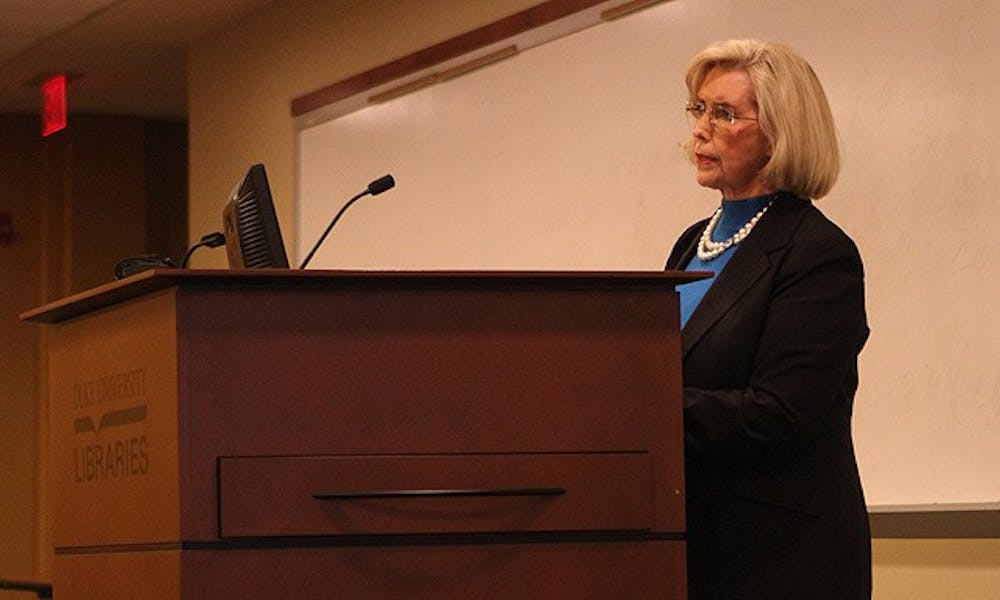When Lilly Ledbetter realized her employer of 19 years paid her significantly less than her male counterparts, she was determined to make things fair for herself and other women—and she did.
Ledbetter took her case for workers’ rights all the way to the Supreme Court, and later Congress. In January 2009, she became the namesake of the first legislative act President Barack Obama signed into law—the Lilly Ledbetter Fair Pay Act, which improved an employee’s rights to challenge wage discrimination. The act amended Title VII of the Civil Rights Act of 1964, which prohibits workplace discrimination on the basis of race and sex.
Ledbetter’s search for justice was not an easy one, and she spoke to an audience of about 40 professors and students in Perkins Library yesterday about her endeavors to improve workers’ rights. Her talk celebrated the beginning of Women’s History Month, and was sponsored by the Duke Office for Institutional Equity, Baldwin Scholars and the Sallie Bingham Center for Women’s History and Culture. It was followed by a question and answer session moderated by Nancy Zisk, professor at the Charleston School of Law.
In her speech, Ledbetter encouraged students who will be entering the workforce soon to take an interest in employee rights. Although Ledbetter’s efforts have strengthened workers’ rights, issues concerning pay inequality still exist today. Now, white women still make 77 cents for every dollar that their male counterparts make, and the discrepancy is even larger for minorities, she noted.
Ledbetter had served as a supervisor in four divisions at Goodyear Tire and Rubber Co. in Gadsden, Ala., when she received an anonymous note stating that her male counterparts were making $500 more per month than her.
“I felt devastated and humiliated when I got that note,” she said. “I got shortchanged not only in my overtime and my pay twice a month, but I get shortchanged today and I will for the rest of my life.”
When Ledbetter brought her case before the U.S. District Court of Northern Alabama, the court ruled in her favor and ordered that Goodyear reimburse Ledbetter $3 million—but this amount was later reduced to $360,000.
After the lawsuit, Goodyear changed Ledbetter’s job description from supervisor to technical engineer—a position that required physical labor that would have left Ledbetter crippled had she continued in her job.
With the help of a pro-bono lawyer, Ledbetter took her case to the Supreme Court in 2006, but the court ruled against Ledbetter in 2007 because she had exceeded the 180-day statutory period of limitations within which she should have submitted her claim. Ledbetter, however, was determined to open this “Pandora’s box” to seek justice.
“I thought about letting it go, but I couldn’t. There is no way. So I stayed with it,” she said of her persistent efforts to challenge the Supreme Court ruling.
Ledbetter began lobbying Congress to broaden the time period during which an employee can file discrimination lawsuits challenging their employers. Eventually, lawmakers decided to take up Ledbetter’s cause in Congress and proposed the Lilly Ledbetter Fair Pay Act.
The passage of the act marks one of the many efforts Ledbetter has taken to be proactive in the protection of workers’ rights. She has also appeared on NPR and ABC News, and in Equal Employment Opportunity Commission training videos and programs designed for law schools in an attempt to spread more awareness about workers’ rights.
Ledbetter’s efforts have also raised further questions about the discrimination in the workplace, noted Zisk, Trinity ’80 and Law ’83, in her moderator remarks after Ledbetter’s speech. Zisk said Title VII also does not account for persons to be eligible for compensation if they discover discrimination after they retire.
Several students at the talk said Ledbetter’s experiences can be used as a learning experience in the classroom and in society.
“As a woman [entering] the workplace, her story encourages me to fight for my own rights,” said junior Zifan Lin, who attended the speech for her class “Women at Work.”
Get The Chronicle straight to your inbox
Signup for our weekly newsletter. Cancel at any time.

